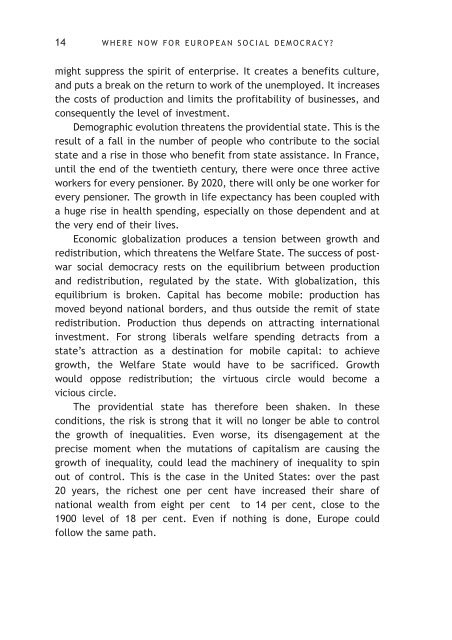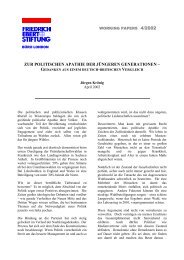Where Now for European Social Democracy? - Policy Network
Where Now for European Social Democracy? - Policy Network
Where Now for European Social Democracy? - Policy Network
You also want an ePaper? Increase the reach of your titles
YUMPU automatically turns print PDFs into web optimized ePapers that Google loves.
14WHERE NOW FOR EUROPEAN SOCIAL DEMOCRACY?might suppress the spirit of enterprise. It creates a benefits culture,and puts a break on the return to work of the unemployed. It increasesthe costs of production and limits the profitability of businesses, andconsequently the level of investment.Demographic evolution threatens the providential state. This is theresult of a fall in the number of people who contribute to the socialstate and a rise in those who benefit from state assistance. In France,until the end of the twentieth century, there were once three activeworkers <strong>for</strong> every pensioner. By 2020, there will only be one worker <strong>for</strong>every pensioner. The growth in life expectancy has been coupled witha huge rise in health spending, especially on those dependent and atthe very end of their lives.Economic globalization produces a tension between growth andredistribution, which threatens the Welfare State. The success of postwarsocial democracy rests on the equilibrium between productionand redistribution, regulated by the state. With globalization, thisequilibrium is broken. Capital has become mobile: production hasmoved beyond national borders, and thus outside the remit of stateredistribution. Production thus depends on attracting internationalinvestment. For strong liberals welfare spending detracts from astate’s attraction as a destination <strong>for</strong> mobile capital: to achievegrowth, the Welfare State would have to be sacrificed. Growthwould oppose redistribution; the virtuous circle would become avicious circle.The providential state has there<strong>for</strong>e been shaken. In theseconditions, the risk is strong that it will no longer be able to controlthe growth of inequalities. Even worse, its disengagement at theprecise moment when the mutations of capitalism are causing thegrowth of inequality, could lead the machinery of inequality to spinout of control. This is the case in the United States: over the past20 years, the richest one per cent have increased their share ofnational wealth from eight per cent to 14 per cent, close to the1900 level of 18 per cent. Even if nothing is done, Europe couldfollow the same path.



